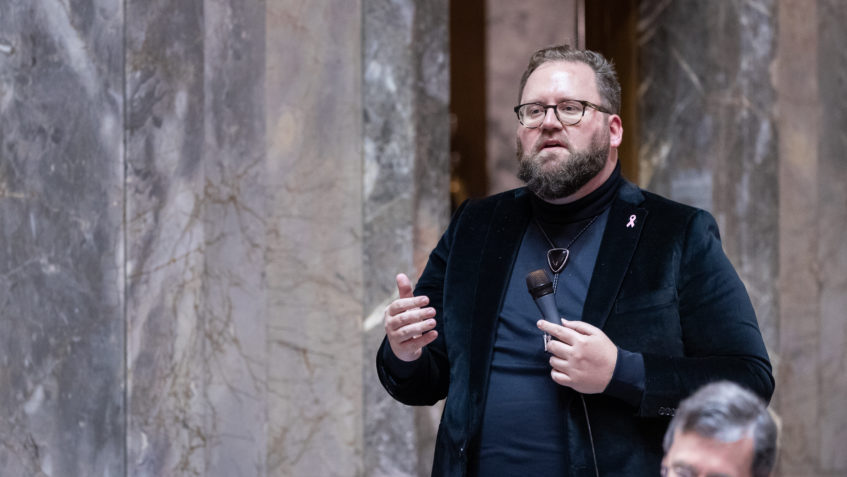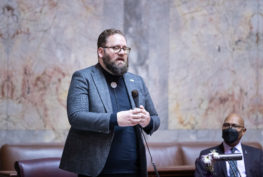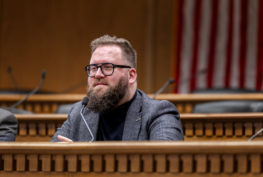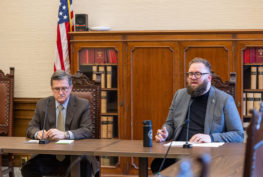OLYMPIA — The Legislature on Thursday passed the supplemental transportation budget (HB 2134), a $14.6 billion plan which prioritizes public safety, preservation and maintenance of existing infrastructure and investments in the ferry system.
“After a thorough negotiation process, I am happy that both chambers came to an agreement about this year’s supplemental transportation budget,” said Rep. Jake Fey (D-Tacoma), chair of the House Transportation Committee.
“The health of our transportation system is vital to the health of our overall economy,” said Senate Transportation Chair Sen. Marko Liias (D-Edmonds). “I’m proud of the work we did this year to reach this agreement. The benefits will be felt in communities across Washington.
The 2024 supplemental budget puts $100 million additional dollars into the preservation of roads, bridges and more statewide. An additional $30.8 million is invested in traffic safety measures, including $9.8 million to help curtail speeding, $7.2 million for the Washington State Patrol (WSP), and $2.5 million to combat impaired driving. An additional $150 million is included toward fish barrier removal to help expand the salmon population and restore river ecosystems.
“The budget funds the state trooper longevity bonus bill that I introduced to improve safety on our roads,” said Fey. “Additionally, the House was the vehicle to allow local jurisdictions to expand authorization for the use of traffic safety cameras.”
One key focus of the supplemental budget is investment in the ferry system. An additional $196 million – all money from the Climate Commitment Act – goes directly toward efforts to build new hybrid electric ferries and projects related to strengthening Washington’s existing fleet. The bulk of that money goes toward conversions for all five new hybrid electric vessels and charging infrastructure, with completion of half of those ready in approximately 2027 or 2028.
This budget prioritizes the workforce needs of the ferry system, building on $36.6 million put toward staffing the last two years. There’s an additional $16.5 million in this supplemental to hire additional crew, as well as funding for additional dispatch and service planning staff. The budget also provides for expanded passenger service in King and Kitsap counties, and increased training opportunities to address workforce shortages.
The budget continues funding on I-405 and SR 520 and maintains the state’s commitment to the I-5 Columbia River Bridge project, investing $875 million, including a new $600 million federal grant.
This budget also contends with a $52 million cost increase on the SR 520 Seattle Corridor Improvements West End project. The total increase including in future years is $770 million. To address this, a $140 million sales tax deferral along with additional funds from future tolling of a stretch of SR 520 will help cover the cost increase. There is also a $253 million increase in costs for I-405/Brickyard to SR 527. This budget delays three remaining I-405/SR 167 corridor projects by two to 10 years and utilizes the recently approved toll rate increases on I-405/SR 167 to balance funding within the corridor. Other projects, such as the North/South Freeway in Spokane and the SR 509/167 Gateway Project in Tacoma remain a priority.
“This budget shows our commitment to maintaining promises to major transportation projects in the Connecting Washington and Move Ahead Washington transportation packages that cover the entire state of Washington,” Fey said. “It allows for mega projects across the state to move forward and enhances spending for road preservation and maintenance in every corner of our state.”
“We make important investments and ensure that we don’t go backwards in any area, but during our work to complete this budget it became increasingly clear that while we were able to make ends meet this time, the challenge of doing so again is only going to increase,” Liias said. “It was certainly a challenge to deal with increased costs brought on by a combination of inflation and the pandemic.
“If the initiative passes, and the Climate Commitment Act is repealed, we will deal with even more funding challenges in addition to potentially devastating cuts at the moment our state can least afford it.”





